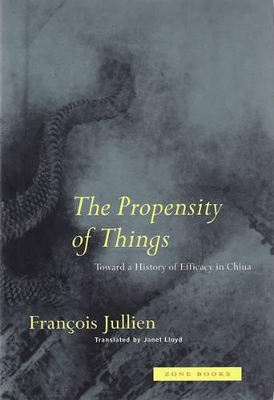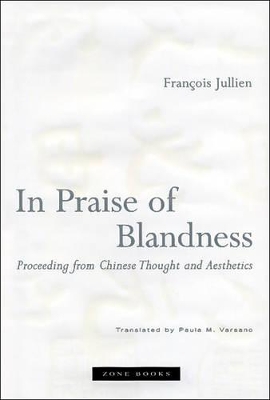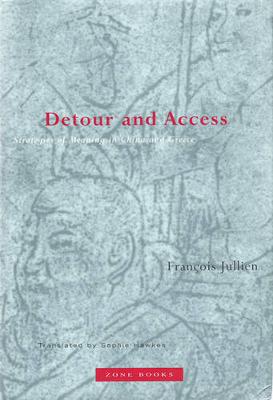Zone Books
4 total works
In this book, his first to appear in English, French sinologist Francois Jullien uses the Chinese concept of shi-meaning disposition or circumstance, power or potential-as a touchstone to explore Chinese culture and to uncover the intricate structure underlying Chinese modes of thinking.
In this strikingly original contribution to our understanding of Chinese philosophy, Francois Julien, a French sinologist whose work has not yet appeared in English, uses the Chinese concept of shi-meaning disposition or circumstance, power or potential-as a touchstone to explore Chinese culture and to uncover the intricate and coherent structure underlying Chinese modes of thinking.
A Hegelian prejudice still haunts studies of ancient Chinese civilization: Chinese thought, never able to evolve beyond a cosmological point of view, with an indifference to any notion of telos, sought to interpret reality solely on the basis of itself. In this groundbreaking study, prejudices toward the simplicity and "naivete" of Chinese thought, Hegelian and otherwise, are dismantled one by one to reveal the intricate and coherent structure underlying Chinese modes of thinking and representing reality.
Jullien begins with a single Chinese term, shi, whose very ambivalence and disconcerting polysemy, on the one hand, and simple efficacy, on the other, defy the order of a concept. Yet shi insinuates itself into the ordering and conditioning of reality in all its manifold and complex representations. Because shi neither gave rise to any coherent, general analysis nor figured as one of the major concepts among Chinese thinkers, Jullien follows its appearance from one field to another: from military strategy to politics; from the aesthetics of calligraphy and painting to the theory of literature; and from reflection on history to "first philosophy." At the point where these various domains intersect, a fundamental intuition assumed self-evident for centuries emerges, namely, that reality - every kind of reality - may be perceived as a particular deployment or arrangement of things to be relied upon and worked to one's advantage. Art or wisdom, as conceived by the Chinese, lies in strategically exploiting the propensity that emanates from this particular configuration of reality.
A consideration of blandness not as the absence of defining qualities but as the harmonious union of all potential values-an infinite opening into human experience.
Already translated into six languages, Francois Jullien's In Praise of Blandness has become a classic. Appearing for the first time in English, this groundbreaking work of philosophy, anthropology, aesthetics, and sinology is certain to stir readers to think and experience what may at first seem impossible: the richness of a bland sound, a bland meaning, a bland painting, a bland poem. In presenting the value of blandness through as many concrete examples and original texts as possible, Jullien allows the undifferentiated foundation of all things-blandness itself-to appear. After completing this book, readers will reevaluate those familiar Western lines of thought where blandness is associated with a lack-the undesirable absence of particular, defining qualities. Jullien traces the elusive appearance and crucial value of blandness from its beginnings in the Daoist and Confucian traditions to its integration into literary and visual aesthetics in the late-medieval period and beyond. Gradually developing into a positive quality in Chinese aesthetic and ethical traditions, the bland comprises the harmonious and unnameable union of all potential values, embodying a reality whose very essence is change and providing an infinite opening into the breadth of human expression and taste. More than just a cultural history, In Praise of Blandness invites those both familiar and unfamiliar with Chinese culture to explore the resonances of the bland in literary, philosophical, and religious texts and to witness how all currents of Chinese thought-Confucianism, Daoism, Buddhism-converge in harmonious accord.
A philosophical inquiry into how to "feed life," or nourish it, draws from early Chinese thinker Zhuanghi to explore notions of breath, energy, and immanence.
The philosophical tradition in the West has always subjected life to conceptual divisions and questions about meaning. In Vital Nourishment, Francois Jullien contends that although this process has given rise to a rich history of inquiry, it proceeds too fast. In their anxiety about meaning, Western thinkers since Plato have forgotten simply to experience life. In this installment of his continuing project of plumbing the philosophical divide between Eastern and Western thought, Jullien slows down, and, using the third and fourth century B.C.E. Chinese thinker Zhuanghi as a foil, begins to think about life from a point outside of Western inquiry.The question of how to "feed life," or nourish it, is the point of departure for the Chinese tradition that Jullien locates in Zhuanghi. Life passes through each of us, and we have a duty to become amenable to its ebbs and flows. We must cultivate a sense of being adequate to it so that we can house it. Exploring notions of breath, energy, and immanence, Jullien reopens a vibrant space of intellectual exchange between East and West. In doing so, he refuses to commit to a rigid framework of meaning, and his text unfolds as an elegant process that mirrors the very type of thought he explores. Pointing out that it seems intellectually and politically imperative today to reinvigorate Western thought with ideas from the East, Jullien seeks to create a space of mutual inquiry that maintains the integrity of both Eastern and Western thinking. Vital Nourishment is both a rich intellectual historical journey and a text very much attuned to the philosophical politics of the present.



